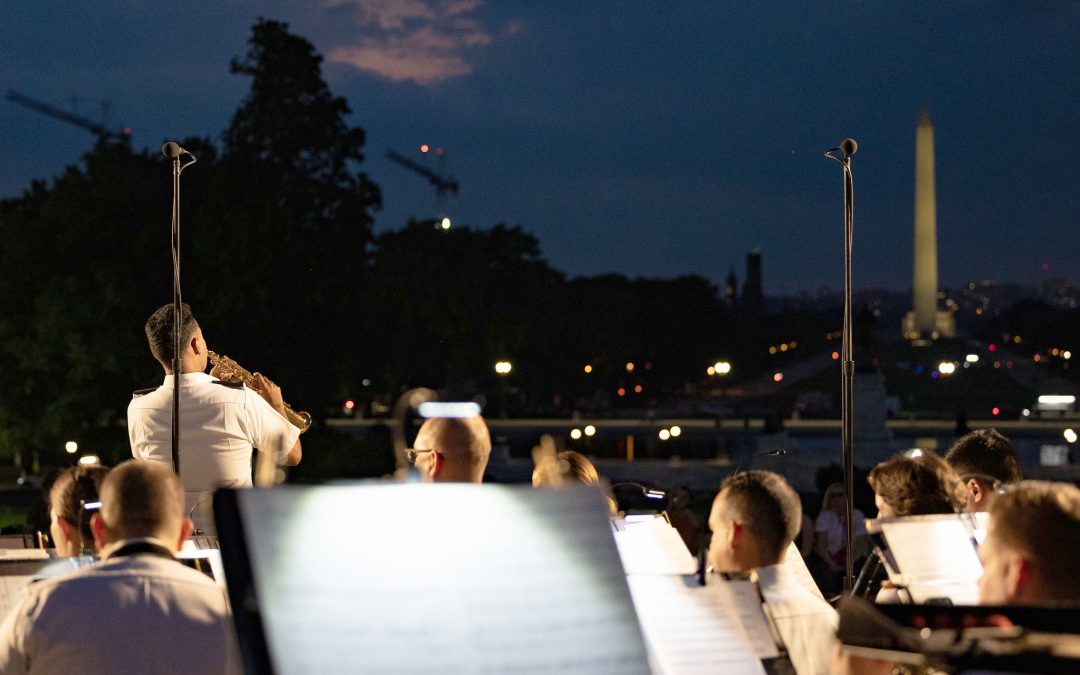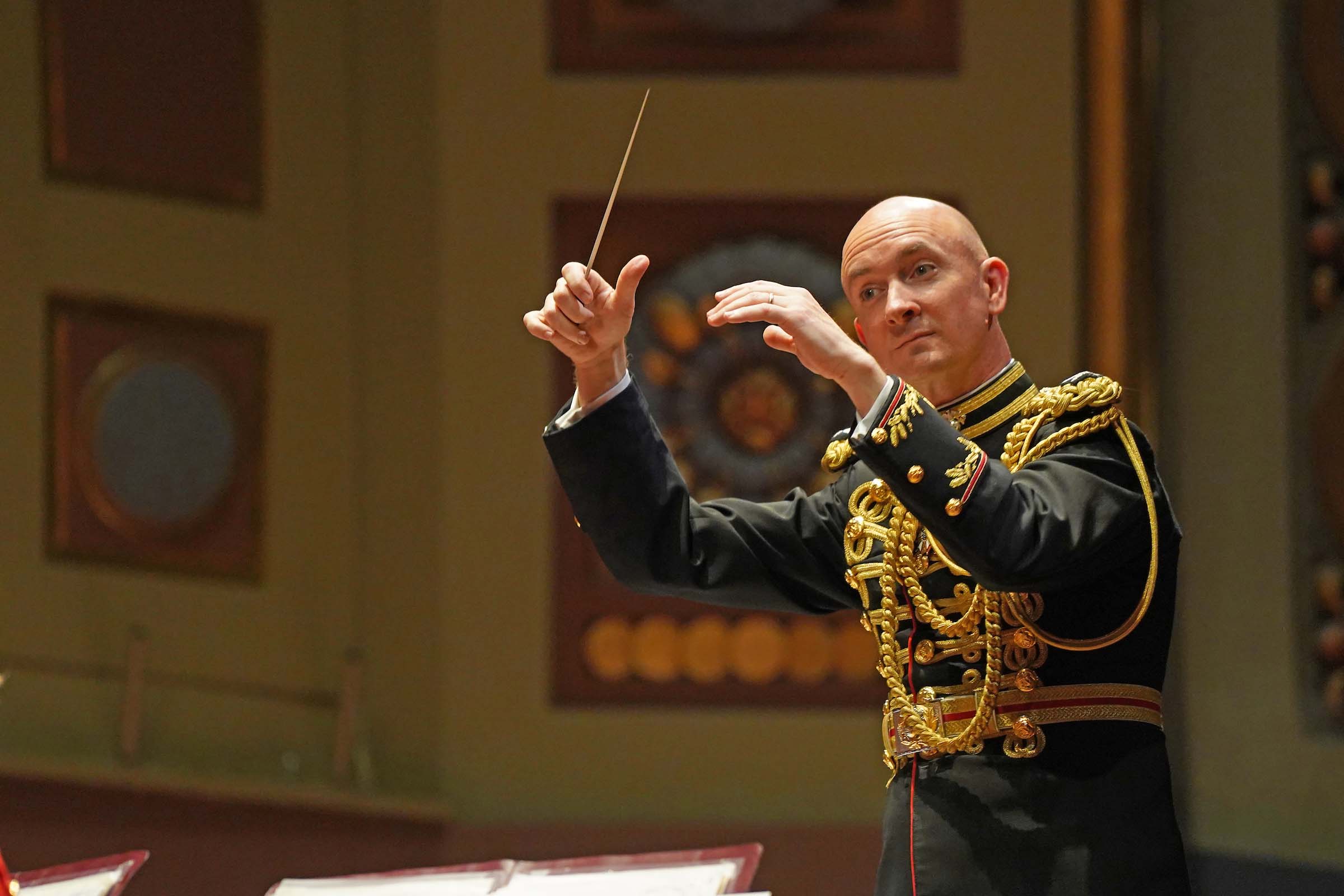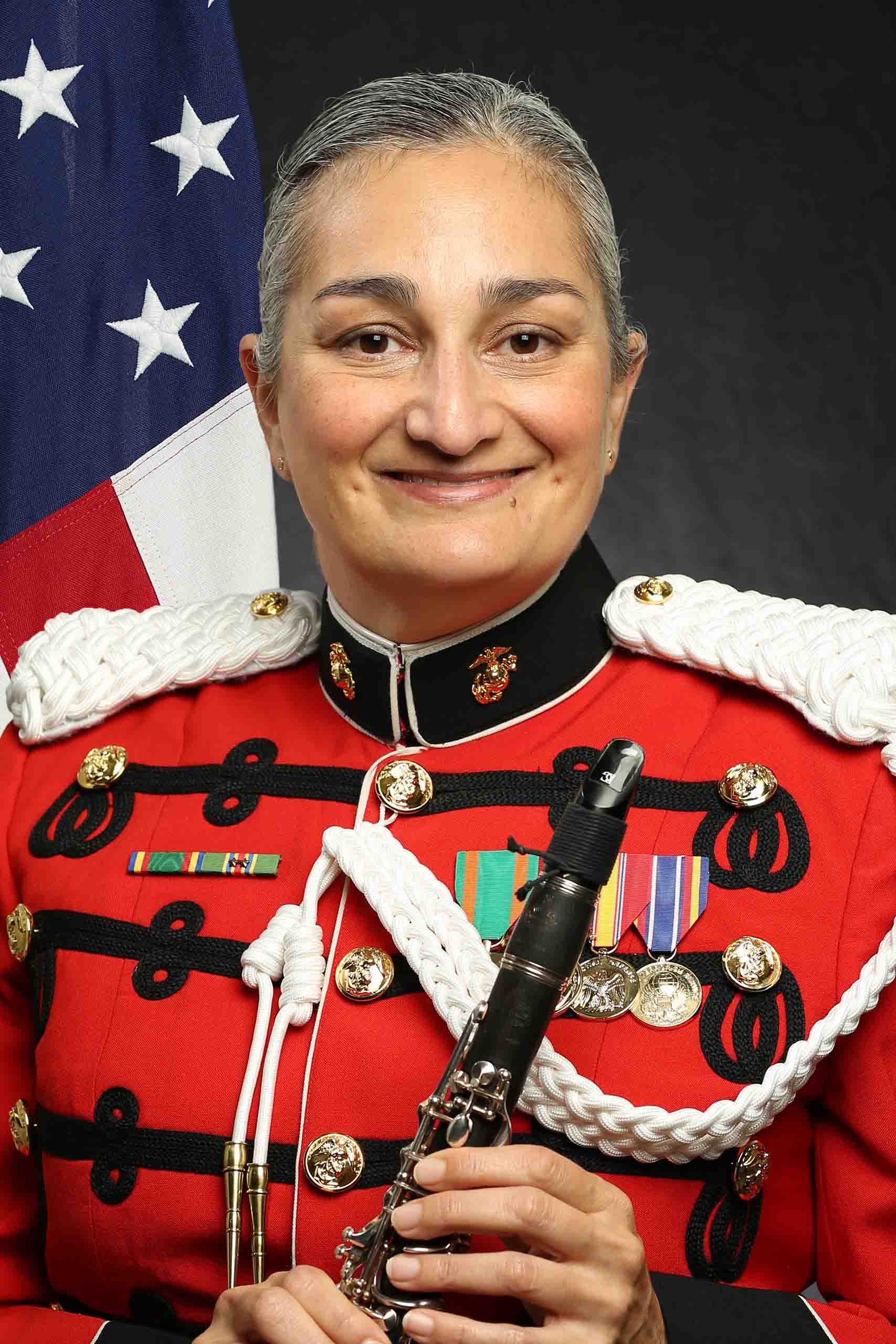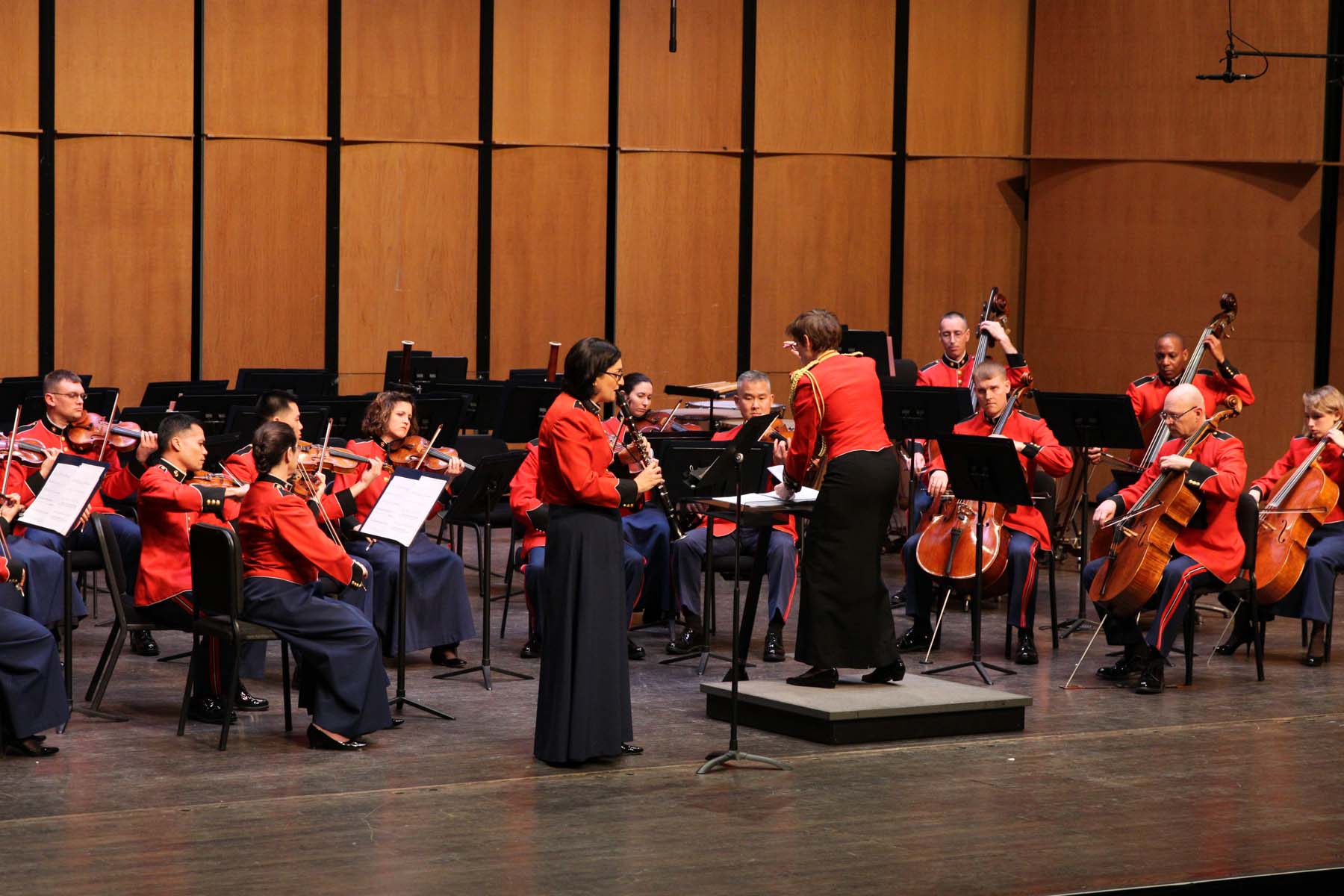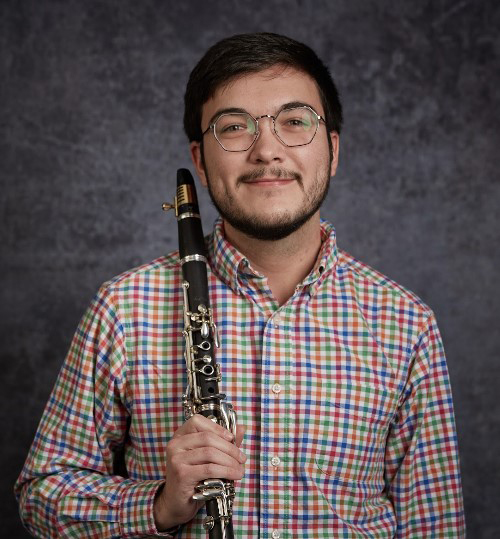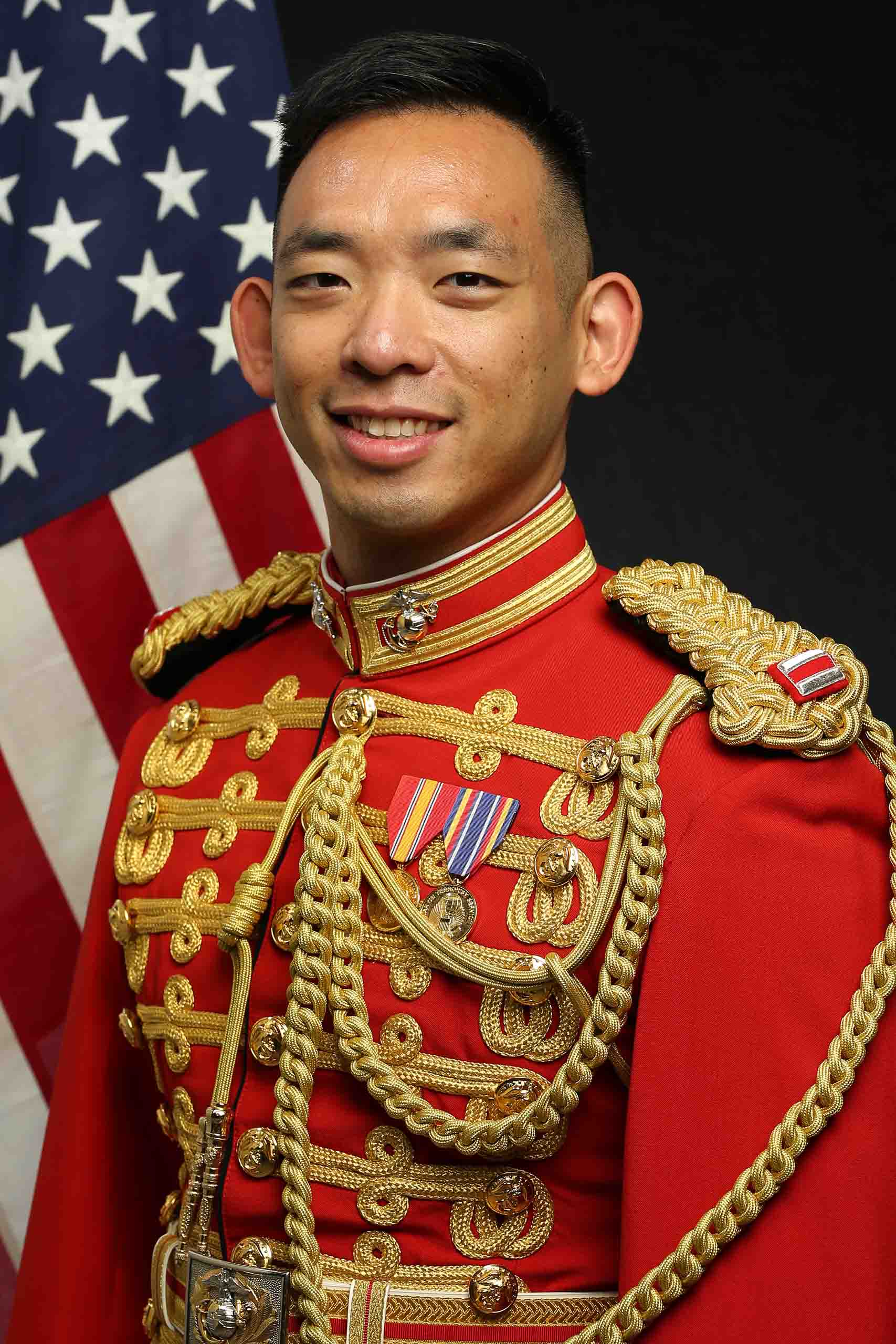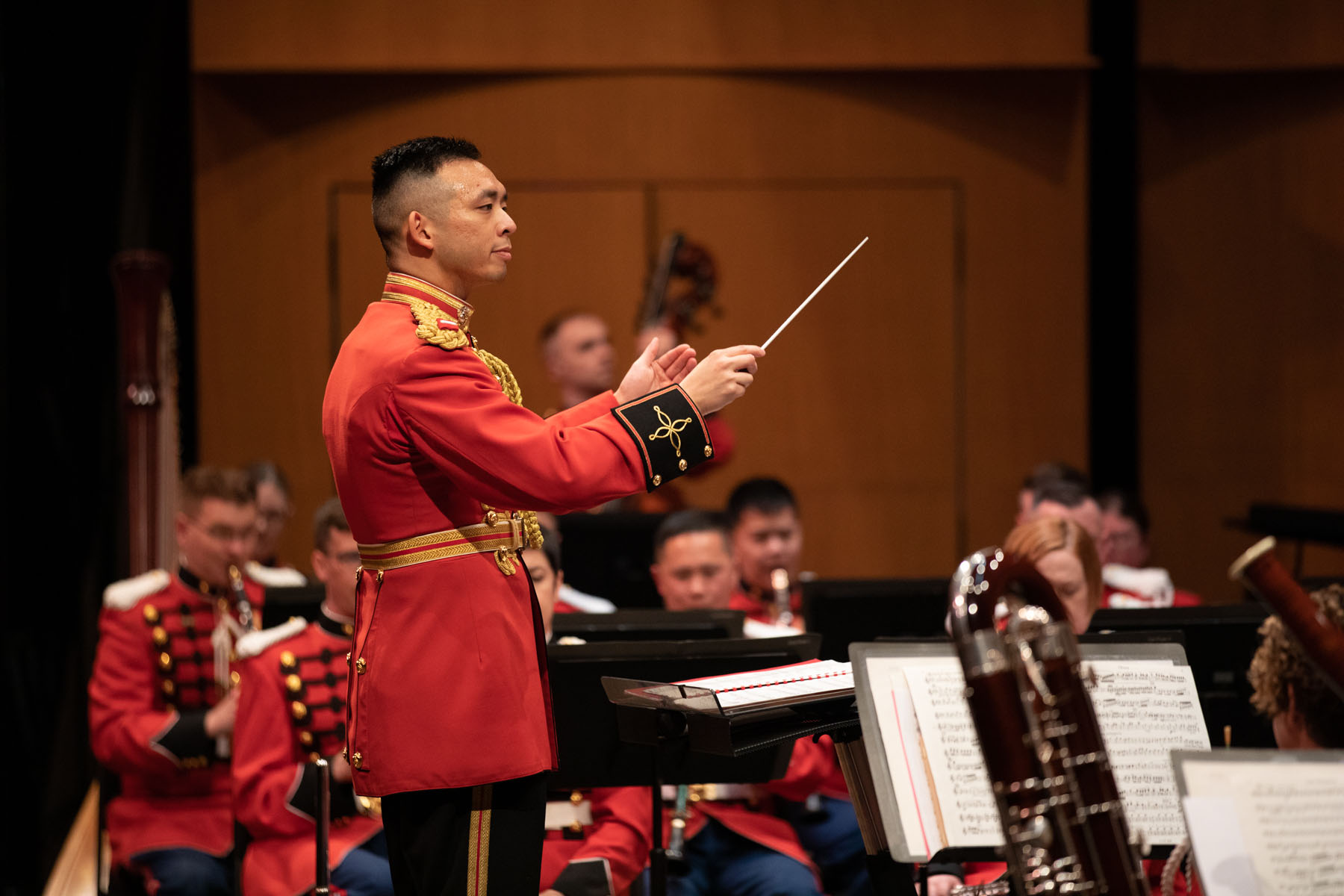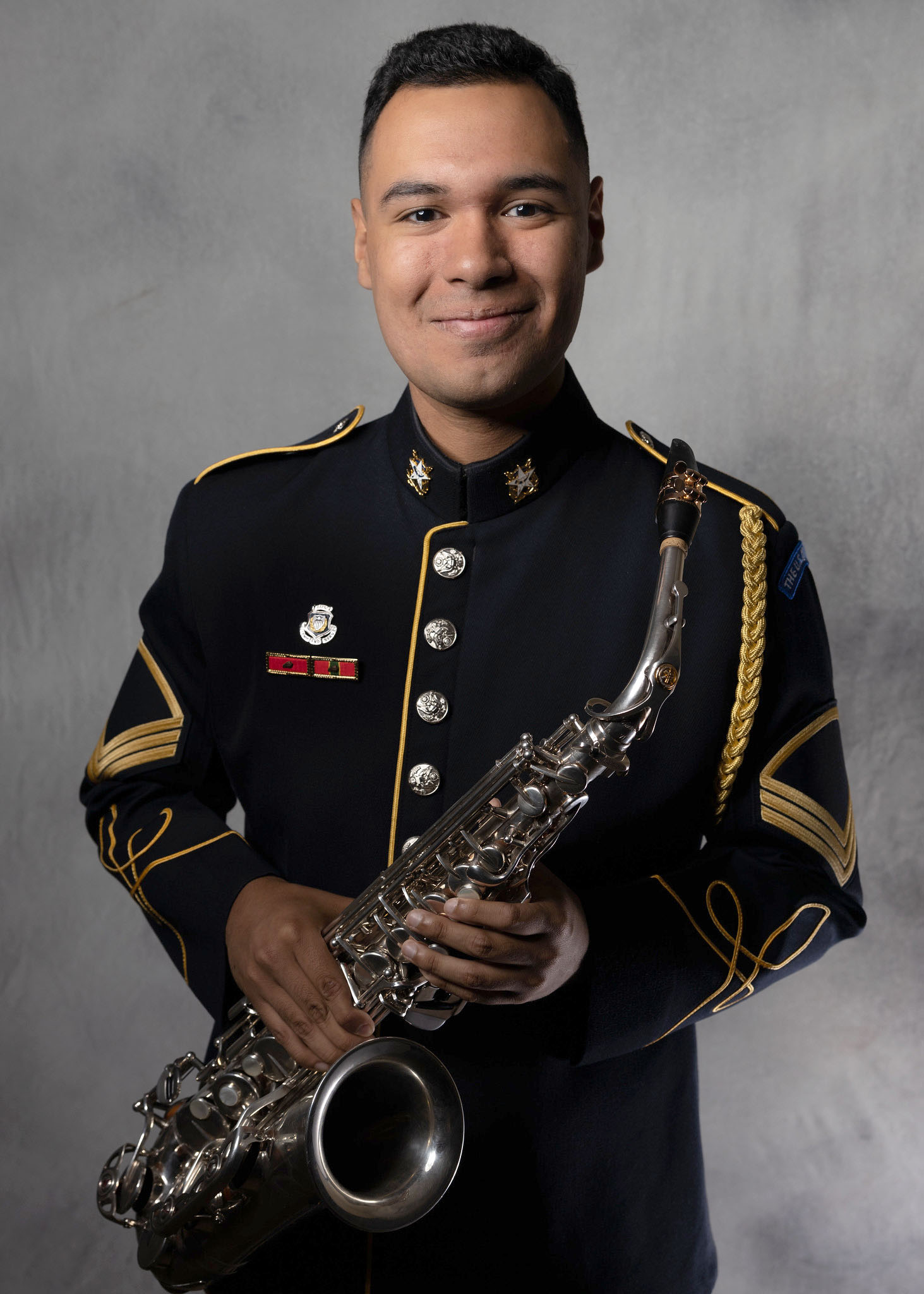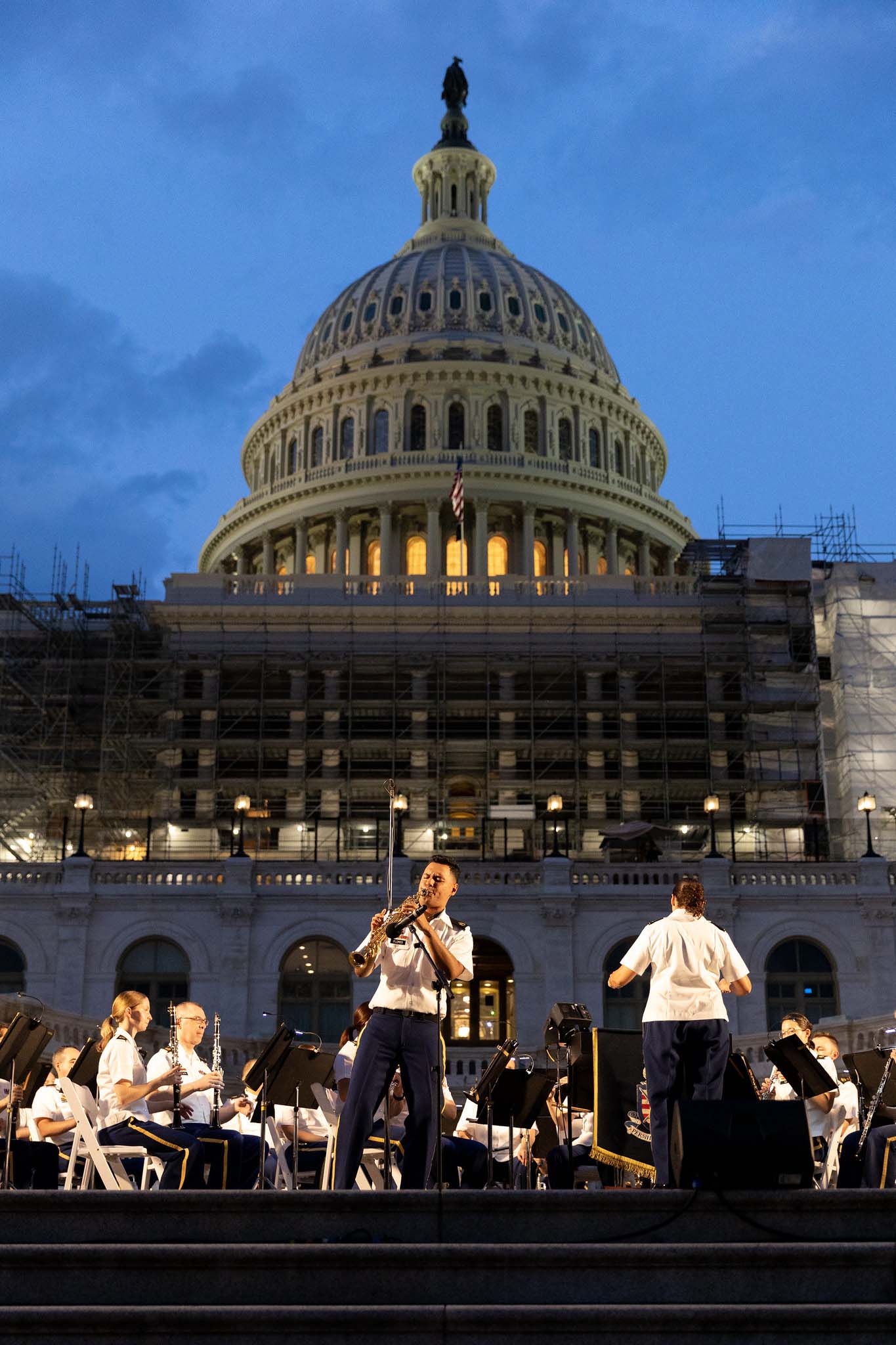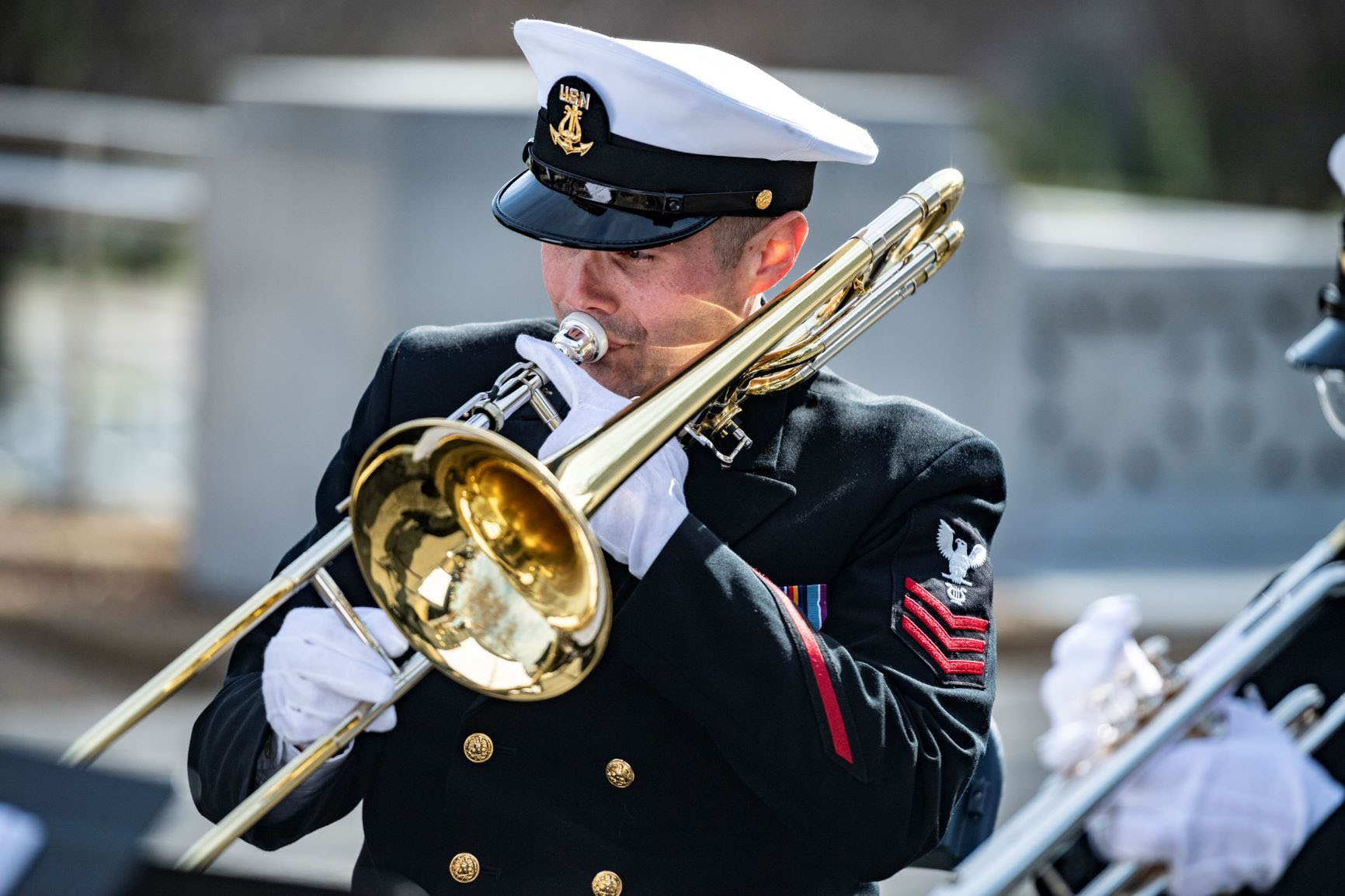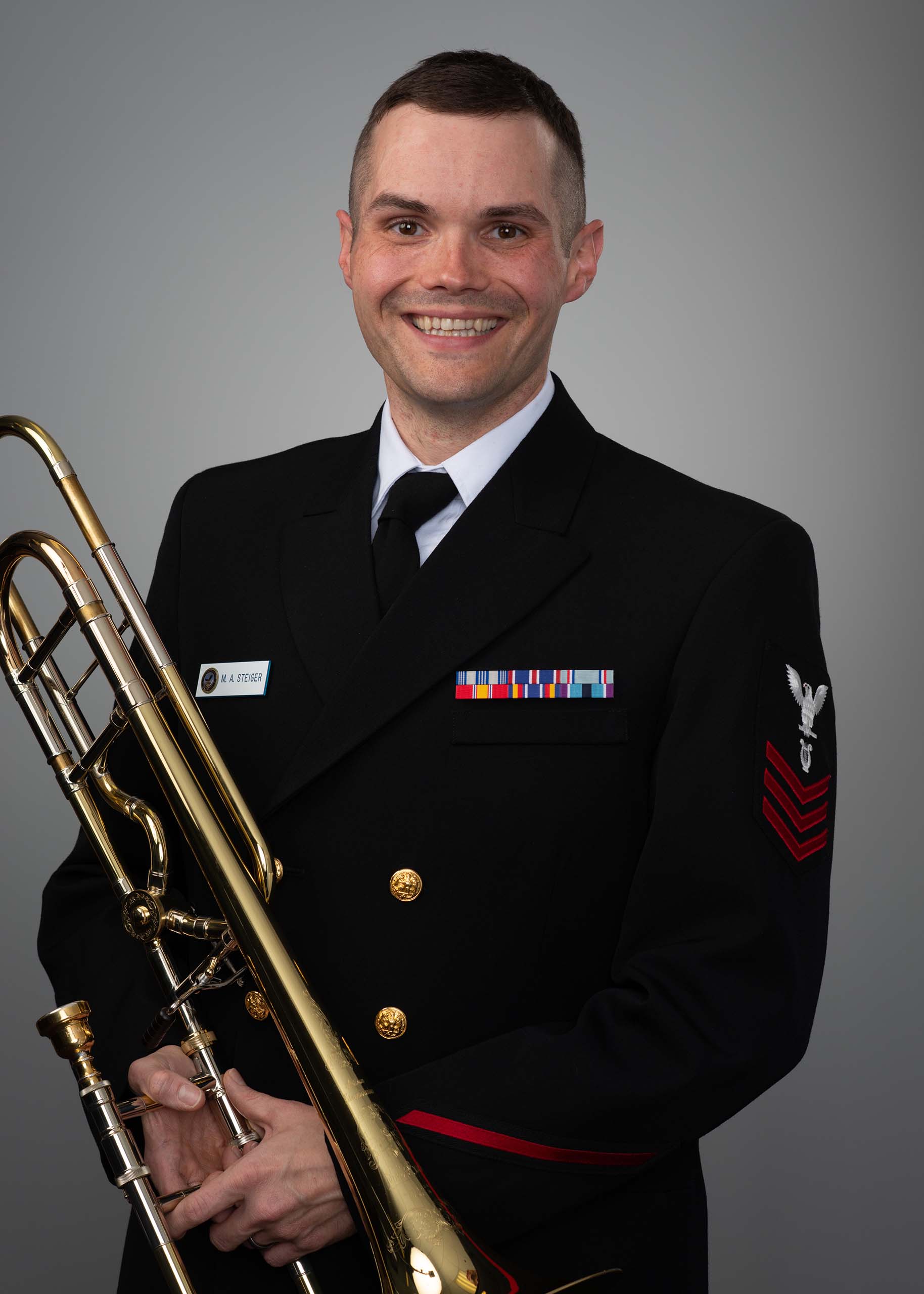Michigan Muse Winter 2024 > A Front-Row Seat to History: Life in a Military Band
A Front-Row Seat to History: Life in a Military Band
By Judy Galens
Twenty-seven years ago, Jason Fettig was an undergraduate clarinet and music education major at the University of Massachusetts Amherst. He knew he wanted to become a professional musician, but he wasn’t sure which path he would take to reach that goal. “I actually had no aspirations specifically to be in a military band,” he recalled. “I didn’t know much about it, had no idea what the qualifications were, what the process was like, or certainly what it would be like to serve in a military band.”
When he responded to an open call for a clarinet audition in “The President’s Own” US Marine Band, Fettig was invited to audition. He earned a spot in the Marine Band, thus launching his professional career. Within four years he was named assistant director of the Marine Band, and in 2014 Lieutenant Colonel Fettig became the 28th director of the US Marine Band and Chamber Orchestra, a position he held for nearly 10 years. Along the way, he earned a master’s degree in orchestral conducting from the University of Maryland, College Park.
Jason Fettig conducting the Marine Band in Hill Auditorium, October 2023. Photo credit: Peter Smith Photography
During his time as director, Fettig worked with hundreds of musicians at every stage of their careers. He conducted performances across every US state except Alaska and in several countries, conducted countless times at the White House, and led the musical program at two presidential inaugurations and one state funeral. He met illustrious actors, filmmakers, and musicians. He conducted performances on nationally broadcast television programs and led world premieres of numerous notable compositions.
In January 2024, Fettig retired from the Marine Corps and entered the next phase of his career: director of bands for the School of Music, Theatre & Dance. In this role, Fettig conducts the Symphony Band, teaches graduate conducting students, sets the direction of the band curriculum, and provides administrative guidance for the entire university band program, including the Michigan Marching and Athletic Bands.
Exploring Military Bands as a Career Path
Fettig’s role at SMTD is one of many links between the school and military ensembles. Over the years, a significant number of SMTD alumni have become professional musicians in the armed services, forging careers with many unique features.
Each branch of the armed services (with the exception of the recently established Space Force) has at least one high-level professional ensemble known as a premier, or special, band. Most of the premier bands are based in and around Washington, DC, and each consists of a primary performing group as well as smaller ensembles. (Each branch of the military also has numerous active-duty ensembles known by other designations – such as fleet bands or field bands – that are based throughout the country.)
The premier ensembles are highly selective and display exceptional musicianship. They serve multiple purposes, from ceremonial to outreach to preserving military traditions and music. They perform in concert halls, at full honors funerals for fallen comrades, and for educational programs in schools and community centers. They also go on tour, bringing band music to audiences across the United States and beyond. These tours serve a public relations function, and they also help convey a message to musicians in the midst of their training: when considering your post-graduation career, keep military ensembles in mind.
Auditioning for premier military ensembles is rigorous and the competition is fierce, but at the same time, simply due to their large size, military ensembles offer abundant opportunities to musicians. In weighing her options at the beginning of her career, Michelle Urzynicok (MM ’96, clarinet) recognized that, “in every orchestra, there are three or four clarinet players at the most, and that’s in the big orchestras. But these service bands have 15 to 25 clarinet players.” She joined the US Marine Band in 2000 and is now a master gunnery sergeant (the highest enlisted rank achievable in the armed forces).
The audition process for a military band is, in many ways, similar to that of any professional ensemble. Some aspects of the audition and onboarding process, however, are unique to the armed services: the need to obtain a security clearance, for example, and to meet certain health and fitness requirements. For most branches – namely the Air Force, Army, and Navy – musicians who are hired must go through basic recruit training alongside other enlisted personnel. Musicians in the Marine Band and US Coast Guard Band are exempted from basic training, though they do go through a training process that teaches them what Fettig describes as the branch’s “customs and courtesies, rights and responsibilities, ethos and culture.” While recruit training may seem daunting, Fettig explained, “it doesn’t stop musicians from auditioning for those excellent bands, because the opportunities in the Army, Air Force, and Navy are amazing. They’re often more than happy to go through whatever gauntlet is required to earn a position as a professional musician.”
While many music students take every audition they learn of, whether it’s a military ensemble or a professional symphony orchestra, others focus their search on military ensembles, having learned about them from family or friends. For two current SMTD students who have secured positions in military ensembles – Nathan Rodriquez (BM ’22, MM ’24, clarinet), who will be joining the US Air Force Academy Band, and Michael Romans (MM ’20, DMA ’24, violin), who will be joining the Air Force Strings – a career in a military ensemble felt very natural: they both grew up in homes where both parents served in the Army. “I was born at the Military Academy up in West Point, New York,” Romans shared, “and my brother was as well, and he’s now a captain in the Air Force. The military is very much in the family. It seems like a very natural fit for what I want to do with my life.” As for Rodriquez, he said it felt “almost destined for me to end up here.” Both are philosophical about their upcoming basic training, viewing it as a very brief chapter in a much longer story: “It’s two months, and then you have a great career,” Rodriquez said.
Once musicians earn a spot in a premier military ensemble, they secure a permanent posting for the duration of their multi-year contract; they don’t move around from base to base, and they don’t get deployed. (Those in the field or fleet bands, on the other hand, rotate to other postings periodically and could, in some cases, be called upon to perform other duties, including deployment.) Premier band musicians quickly learn that a career in a military ensemble is multi-faceted and offers many advantages.
Practical Advantages of the Military Band Experience
Several of those advantages might be described as practical considerations. For example, a job in a premier band offers a competitive salary, because premier band members enter the military at an elevated rank compared to other enlisted personnel. The military “needed to recognize the level of education and talent that these musicians brought,” Fettig explained, “and they needed to keep the pay competitive with what they could earn in a civilian organization.” In addition, military bands also offer a level of stability and job security that is atypical for professional musicians. Speaking prior to his retirement from the Marine Band, Fettig said, “I’ve been here since I graduated from college. I’ve never had to worry about my employment. I’ve never had to worry about my organization folding or pay cuts or my health insurance. That is stability you simply can’t put a price tag on.”
Because they tend to promote from within, military bands also provide opportunities for career growth. Fettig joined the Marine Band as a clarinetist in 1997; after just a few years, he pursued opportunities to conduct the band and, in 2001, he was promoted to assistant director. Ultimately, of course, he rose to become director, a circumstance he finds “incredible,” even now. Several years later, Darren Lin (BM ’14, percussion) followed a similar path. He joined the Marine Band as a percussionist in 2019, and when a spot opened up for assistant director in 2021, he went for it. “I put in my name, not really expecting that I would be considered, since I was so new. But I was selected as the next assistant director. It’s very surreal.” Then, upon Fettig’s retirement in December 2023, Lin was promoted again, to associate director.
Musical Motivations
Practical considerations like salary and job security would mean far less if members of military ensembles did not also find the work fulfilling artistically. For those musicians who love the band repertoire – from ceremonial marches to concert band music – military bands provide a unique professional option, and these ensembles explore the full range of traditional and contemporary band repertoire. “We’re very much cutting edge, developing new repertoire with living composers,” Lin explained of the Marine Band. “One of our members describes performing arts institutions as living museums. There’s a lot of tradition, there’s a lot of history that we embrace and we love to share. But we also are always working with new people and always broadening the repertoire.” Members of premier service bands aren’t limited to just band repertoire, though; every premier band has smaller ensembles that explore other styles of music, from the Marine Band’s full chamber orchestra, to the Air Force Strings, to choruses, to groups focusing on jazz, blues, country, and pop.
Musicians in the premier ensembles cite both the exceptional musicianship within the ensembles and the frequent exposure to other world-class musicians as significant benefits of their roles. Lin mentioned the sometimes “surreal environments” they find themselves in, as when one of the Marine Band’s jazz combos was performing at the White House, and Wynton Marsalis, who just happened to be there, sat in with them and played a couple of tunes. “I can’t think of another place where that would happen with such regularity,” he said. They also have abundant opportunities to be highlighted within the ensemble, as Urzynicok shared of her experience: “We usually have a soloist on every concert, and 95 percent of the time it’s someone from within the ensemble. So that’s an amazing opportunity. I’ve gotten to play probably five or six concertos with either the band or the orchestra during my 23 years in the Marine Band. And that’s really hard to accomplish just about anywhere else.”
The sheer variety of musical duties keeps military musicians engaged. “There’s always something new to experience in a military band,” said Fettig. “You don’t get burned out or bored, because every day is a different challenge. There’s such a disparate and wide range of experiences that we have, and a wide range of constituents that we have to make happy; as an artist, that’s an interesting challenge to meet every day.” Salvador Flores (BM ’21, saxophone; MM ’22, saxophone, improvisation), a staff sergeant who plays saxophone in the US Army Ceremonial Band, also has opportunities to perform with the Army’s Concert Band and Jazz Big Band. He noted, “I’ve gotten to play at White House presidential arrivals, a concerto on the steps of the US Capitol and the Lincoln Memorial, at music education conferences, and at many important ceremonies at the Arlington National Cemetery and the Pentagon.”
The “Extra-Musical” Features of Life in a Military Band
In speaking about his career in the Marine Band, Fettig talks about what he calls the “extra-musical” facets, like having “a front-row seat for some of our nation’s most important events.” He recalled that “the opportunity to work at the White House, to be a part of so many national events and so many moments of import to our country – and then adding music to that – was a very special aspect of the position and of the organization.” His former colleague and fellow Marine Band conductor Darren Lin agreed: “This job is history-adjacent. Even in the short time I’ve been in the band, to have been witness to a lot of historical things, like the swearing in of Supreme Court justices, the signing of huge bills that impact so many American people – it is humbling to be there. Music for music’s sake is always very nice. But it is great to balance that out with moments of high importance and decorum.”
Once they become immersed in the life of a military musician, Fettig notes, many people find an unexpectedly powerful quality: “The esprit de corps, the kind of community sense of mission and a dedication to duty is off the charts.” In addition to educational and community service activities, one of the most significant mission-driven roles for military bands is playing full honors funerals at Arlington National Cemetery. “It’s a very moving and substantial ceremony,” Fettig shared, “and music is a huge part of that.” Michael Steiger (BM ’10, trombone) noted the connections made with veterans, particularly when the Navy Band goes on tour throughout the country. “Especially for veterans, it’s so meaningful for them to hear a service song played and see people in uniform. It’s a special job, to get to enrich people’s lives in a very meaningful way.”
SMTD: “A Lab of Professionalism”
Regardless of the path students take after graduating from SMTD – whether that involves joining a military band or countless other options – it’s vitally important that they are adequately prepared to succeed. Part of that preparation comes from being surrounded by talented, supportive peers. “In general,” Salvador Flores recalled, “SMTD is full of amazing musicians all around… Just being in that environment for many years is enough to prepare anyone for just about anything.” Part of that preparation also comes from being in the midst of a community with a thriving performing arts scene, as noted by Michelle Urzynicok: “The University Musical Society brought in so many guest artists and orchestras who would come through Ann Arbor, Michigan. The Berlin Philharmonic comes [to the US], and they play in Carnegie Hall, they play in Chicago Symphony Hall, and they play in…Hill Auditorium. It’s ridiculous to get to hear that caliber of artistry right there on campus. We learned so much from that.”
Perhaps the most significant preparation for a post-SMTD career comes directly from the faculty. Nathan Rodriquez studies with Dan Gilbert and Chad Burrow at SMTD, and he attributes his success to his professors: “They are very supportive. They just want everyone to be successful in their own right.” Michael Romans, who studies with Danielle Belen and Fabiola Kim, echoed that sentiment, noting that the support from his teachers has gone well beyond classroom instruction: “So many opportunities led to this moment, and I have my teachers to thank for all of that, because they would say, You should apply to this music festival, you should get in touch with this professor, you should pursue this performance opportunity. They’ve played a really big part in who I’ve become.” Thinking back to his time at SMTD, Michael Steiger noted, “My teacher, David Jackson, is very audibly present in my head when I’m thinking of what a trombone should sound like. Michigan is a unique place in that you are sought after and cared for as a student by all the faculty. They all want the best thing for you.”
In addition to studio instruction, alumni cite the invaluable experience of playing in large ensembles while studying at SMTD. Pointing to the high level of organization and exacting standards of the Symphony Band, conducted by the recently retired Michael Haithcock, Arthur F. Thurnau Professor Emeritus of Music, Rodriquez said, “Being in Professor Haithcock’s ensemble was one of the best things to prepare people for a band or orchestra job. He ran the band like a professional ensemble.” Recalling that Haithcock referred to the Symphony Band as a “lab of professionalism,” Salvador Flores said, “That band was absolutely incredible, from the overall level of musical cohesion down to the individual members and peers. Professor Haithcock always treated the Symphony Band like a true professional ensemble. I can very confidently say there was no other course that could more perfectly prepare me for a position with the US Army Band than the University of Michigan Symphony Band.”
In His Own Words, Jason Fettig Answers the Question, “Why Michigan?”

Jason Fettig
I always wanted to teach. I was a music ed major, and I was totally set on teaching for a living. My entire career in the Marine Band, I’ve tried to expand our educational resources, and I’ve tried to teach as much as I could. I’ve been blessed to be able to work with students and professors at over 40 colleges and universities during my time in the band.
I always knew that when I left the Marine Band, I wanted to go into higher education. My time with the Marine Band was coming to an end, and I wanted to be very careful not to stay in charge for too long. I think that fresh voices and new perspectives are very important, so I knew that within the next couple of years it was going to be time for me to move on and turn over the the keys to my successor, and it just so happened that this opportunity at Michigan came up at just the right time, and I was the right candidate. It was a perfect transition for me, and I feel so incredibly lucky to be entrusted to carry on this program from Professor Haithcock and to serve the students at this great institution.
Michigan is a legendary band program and an incredible university. It’s a school that I have watched with great admiration for many, many years from my position in the Marine Band, and a lot of the things that have happened at Michigan, artistically and with the curriculum, dovetail very beautifully with what we’ve done in the Marine Band.
From the moment that I was welcomed for my interview and my audition, I felt like this was a community that really supported each other and that had a real sense of purpose and mission for what we do for the students. The success rate of students coming from the University of Michigan is simply incredible. The anecdotal evidence of this being a very special school with a very special faculty is plainly apparent, and I’ve known that for quite a long time. I’m really looking forward to being a part of that culture and doing whatever I can to further elevate it and help our students fulfill their professional aspirations.

